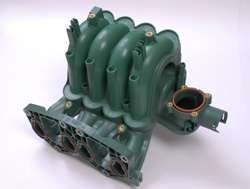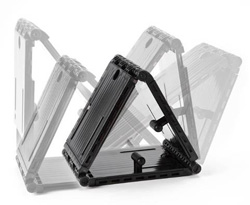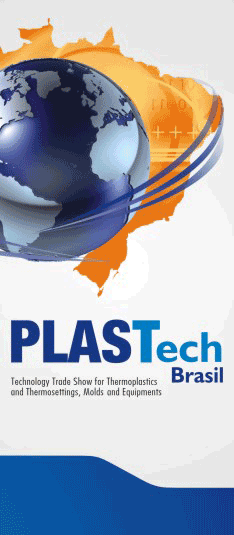
| Brazilian Plastics News |
Rhodia launches innovations in engineering plastics and specialty polymers at Feiplastic 2013
These new products, created by the Engineering Plastics and Specialty Polymers global business areas, which are being introduced at Feiplastic 2013 – the International Plastic Trade Fair (May 20 to 24, in Paulo, Brazil), expand the Solvay Group’s offerings of products and technologies focused on sustainability available to the sector. New launches – In the engineering plastics area, the company’s main new launch is Technyl® ECO, an application created in Brazil for engineering plastics based on recycled polyamide 6.6, which is obtained in an exclusive chemical recycling process produced by Rhodia that uses the waste from polyamide textile and industrial yarns. This process guarantees Technyl® ECO’s excellent mechanical properties and maintains its thermal properties, meaning it can be used in high-performance pieces, while significantly reducing its CO2 equivalent. Analysis of the product in industrial applications has shown that using this recycled polyamide reduces CO2 equivalent emissions by 70% and energy consumption by 76% compared with virgin compounds. Another important facet of Technyl® ECO compounds is Rhodia-assured quality. Initially focused on the automotive segment, Technyl® ECO polyamides can be applied in the production of various autoparts The first autopart created out of this recycled polyamide, an intake manifold, was developed by Rhodia and Magneti Marelli, a leader in the development and production of high-technology vehicle systems and components. The intake manifold gets air to the engine, and also acts as a mount for the carburetor and throttle body. Investment in sustainable innovation - “Our strategic planning to strengthen our position of leadership in engineering plastics based on polyamide 6 and 6.6, comprises the permanent development of innovation that focuses on sustainability in every aspect ad it is in line with society’s main trends today,” says Marcos Curti, director for the Americas at the Engineering Plastics global business unit at the Solvay Group. The company recently concluded the installation of a mega compounder extruder, an investment that has increased the capacity of the São Bernardo do Campo industrial unit by 15% to serve the markets in Latin America. Rhodia’s polyamide 6 and 6.6 engineering plastics are used mainly in the production of parts for the automotive, electronics, industrial and consumer goods sectors. “We supply clients’ needs and work with them to create new applications for both the domestic and export market,” adds Curti, offering as an example Rhodia’s engineering plastic, halogen-free flame-retardant products. Technyl, 60 years of innovation- At Feiplastic 2013, under the slogan, “60 years of innovation,” Rhodia celebrates the Technyl brand, which has become internationally recognized as one of the leading product lines and expertise in engineering plastics and has contributed to the growth of numerous industrial applications in the automotive, electrical, industrial and consumer goods markets. Specialty polymers – One of the Solvay Group’s major lines at the event will be Specialty Polymers, a global business unit in which the company has a vast portfolio of products and applications for diverse markets. “We are ready to keep up with the technological growth in Brazil in the next few years, for products we supply and by the skill of our professional teams,” says Alexandre Guimarães, Sales and Marketing manager at the Specialty Polymers global business unit for South America. This Solvay Group business area will introduce a range of new products at the event. For example, in the Healthcare segment, in which the company’s specialty polymers are being used more and more, replacing metal, glass, and other materials, one of the innovations is the Bender triangle, a fully adjustable mount for orthopedic surgery developed by the US company Tri-Medics, LLC, one of the leading manufacturers of medical devices and instruments.
In the industrial segment, Solvay’ launches a new grade in the Halar® line of high-performance polymers used in linings to prevent corrosion. Any company that in any way handles chemical products will find in these coating polymers a solution as – or more effective – at a better cost–benefit ratio than metal solutions, such as stainless steel and other special alloys. The new grade is for electrostatic painting applications, which are very common for small pipes and parts which have a certain limitation on layer thickness. Solvay’s anticorrosive lining polymers are also used in some applications in the Oil & Gas sector. For the automotive segment the company offers polymers used in the production of parts for aggressive environments, including those that are immersed in biodiesel. Solvay’s specialty polymers are used in the production of autoparts such as water pumps and cooling systems, washers and transmission bearings, and electrical connectors using “Reflow” technology. Solvay introduces parts with special polymers for faucets, connections and hot water valves that replace brass. There is also the first chromable material with a structural function, which is one of the most mechanically resistant materials on the market to serve aesthetic demands. Different new grades serve applications that suffer wearing by abrasion and even higher temperatures in the automotive sector. Grades of new materials such as Polyphthalamide Amodel ® PPA meet the requirements for turbochargers at 220ºC for thousands of hours. Amodel ® PPA can now replace metals in water meters.
|

 May 20, 2013 – Rhodia, a Solvay Group company, in order to strengthen its leadership on the polyamide 6 and 6.6 compounds and specialty polymers markets, is launching innovations to meet the needs of diverse application segments for these products.
May 20, 2013 – Rhodia, a Solvay Group company, in order to strengthen its leadership on the polyamide 6 and 6.6 compounds and specialty polymers markets, is launching innovations to meet the needs of diverse application segments for these products.  Weighing only four kilos, the triangle is made of Polyphenylsulfone (PPSU) and offers surgeons a simple, easy to use solution, as it is adjustable, withstands repeated autoclaving, and is radiotransparent in the use of x-rays. It is a highly effective alternative to mounts made of rubber foam and metal, which are more expensive and more complicated to use.
Weighing only four kilos, the triangle is made of Polyphenylsulfone (PPSU) and offers surgeons a simple, easy to use solution, as it is adjustable, withstands repeated autoclaving, and is radiotransparent in the use of x-rays. It is a highly effective alternative to mounts made of rubber foam and metal, which are more expensive and more complicated to use.